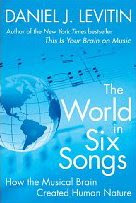
Monday, March 2, 2009
Do you know the way to Carnegie Hall?

Tuesday, February 24, 2009
Music Lessons
 Six months ago I thoroughly enjoyed Daniel Levitin's first best-selling book, "This is your Brain on Music: the Science of a Human Obsession". Levitin's book is the fascinating story of the nature of music and how the human brain hears, understands and responds to the music in our lives. Dr. Levitin is no ordinary sort of scholar. Born in San Francisco in 1957, Levitin studied electrical engineering at the MIT and music at the Berklee College of Music before dropping out of college to join a succession of bands. After a he returned to school in his thirties he obtained his B.A in cognitive science at Stanford University and an M.Sc. and Ph.D. from the University of Oregon. Along the way he worked as a recording engineer and producer, including on albums by Blue Oyster Cult, Chris Isaak, Santana and the Grateful Dead and as a consultant to Steely Dan and Stevie Wonder. An unusual resume to say the least.
Six months ago I thoroughly enjoyed Daniel Levitin's first best-selling book, "This is your Brain on Music: the Science of a Human Obsession". Levitin's book is the fascinating story of the nature of music and how the human brain hears, understands and responds to the music in our lives. Dr. Levitin is no ordinary sort of scholar. Born in San Francisco in 1957, Levitin studied electrical engineering at the MIT and music at the Berklee College of Music before dropping out of college to join a succession of bands. After a he returned to school in his thirties he obtained his B.A in cognitive science at Stanford University and an M.Sc. and Ph.D. from the University of Oregon. Along the way he worked as a recording engineer and producer, including on albums by Blue Oyster Cult, Chris Isaak, Santana and the Grateful Dead and as a consultant to Steely Dan and Stevie Wonder. An unusual resume to say the least.His second best selling book, is a discourse on the role of music in human evolution and development entitled, "The World in Six Songs - How the Musical Brain Created Human Nature", which is a little less entertaining but no less fascinating. In it he describes the role music has played in the human experience from primitive to modern societies. He believes all music (or songs as he defines them) falls into one of six categories: songs of friendship, joy, comfort, knowledge, religion and love and that each type of song has played a significant role in defining human nature as we know it today.
Levitin relies heavily on Darwin's theory of natural selection as the underlying mechanism causing the human brain to evolve in its ability to create and use music in the furtherance of humanity. This is a big deal... that music has been so important in the evolution of human society that nature selected humans with brains most musically capable to survive and procreate.
As a photographer I found myself wondering (and admittedly with some degree of envy) if photography has in as significant a way also contributed to human development. Of course we have only had technology like lenses, film and pixels in the most recent small slice of our human existence, but in the broader sense the practice of conveying the world we see around us by graphically representing it to others has been around for millions of years. Whether scratching on the walls of caves, tracing an image projected by a Camera Obscura or transmitting digital images across the web, this has always been a part of the human experience; arguably with no less an impact to our survival and development Consider images that warning of the presence of an enemy or danger, that record human activity or convey the knowledge of how something appears. Although materials and crafts have varied, the skills and cognitive processes are similar: the recognition of a visual experience worthy of capture and preservation, previsualization of how the experience can be represented to others and the skill required to execute that vision.
As students of great photographers that came before us we recognize these same common skills among them. The ability to recognize a photographic opportunity, to previsualize it as a photographic result and the skill necessary to achieve that result. It sounds easy, but it's not. It curious that some of us are obsessed with this photographic process and spend our lifetimes perfecting the required skills, while others fail to share or understand our fascination. It could be that some possess the random chromosomal combinations that tend to heighten the visual experience and they are therefore drawn to photography as a form of expression. Perhaps nature has selected some of us to pursue this mission as a way to fulfill a necessary role in the advancement of human and societal development.
If this sounds far fetched, try imagining the world we live in without photographic images. And if we didn't photograph the world around us, who would?

